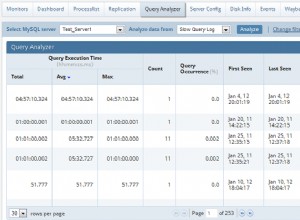pg thư viện cung cấp hỗ trợ đầy đủ cho API không đồng bộ của PostgreSQL. Tôi đã thêm một ví dụ
về cách sử dụng nó cho samples/ thư mục:
#!/usr/bin/env ruby
require 'pg'
# This is a example of how to use the asynchronous API to query the
# server without blocking other threads. It's intentionally low-level;
# if you hooked up the PGconn#socket to some kind of reactor, you
# could make this much nicer.
TIMEOUT = 5.0 # seconds to wait for an async operation to complete
CONN_OPTS = {
:host => 'localhost',
:dbname => 'test',
:user => 'jrandom',
:password => 'banks!stealUR$',
}
# Print 'x' continuously to demonstrate that other threads aren't
# blocked while waiting for the connection, for the query to be sent,
# for results, etc. You might want to sleep inside the loop or
# comment this out entirely for cleaner output.
progress_thread = Thread.new { loop { print 'x' } }
# Output progress messages
def output_progress( msg )
puts "\n>>> #{msg}\n"
end
# Start the connection
output_progress "Starting connection..."
conn = PGconn.connect_start( CONN_OPTS ) or
abort "Unable to create a new connection!"
abort "Connection failed: %s" % [ conn.error_message ] if
conn.status == PGconn::CONNECTION_BAD
# Now grab a reference to the underlying socket so we know when the
# connection is established
socket = IO.for_fd( conn.socket )
# Track the progress of the connection, waiting for the socket to
# become readable/writable before polling it
poll_status = PGconn::PGRES_POLLING_WRITING
until poll_status == PGconn::PGRES_POLLING_OK ||
poll_status == PGconn::PGRES_POLLING_FAILED
# If the socket needs to read, wait 'til it becomes readable to
# poll again
case poll_status
when PGconn::PGRES_POLLING_READING
output_progress " waiting for socket to become readable"
select( [socket], nil, nil, TIMEOUT ) or
raise "Asynchronous connection timed out!"
# ...and the same for when the socket needs to write
when PGconn::PGRES_POLLING_WRITING
output_progress " waiting for socket to become writable"
select( nil, [socket], nil, TIMEOUT ) or
raise "Asynchronous connection timed out!"
end
# Output a status message about the progress
case conn.status
when PGconn::CONNECTION_STARTED
output_progress " waiting for connection to be made."
when PGconn::CONNECTION_MADE
output_progress " connection OK; waiting to send."
when PGconn::CONNECTION_AWAITING_RESPONSE
output_progress " waiting for a response from the server."
when PGconn::CONNECTION_AUTH_OK
output_progress " received authentication; waiting for " +
"backend start-up to finish."
when PGconn::CONNECTION_SSL_STARTUP
output_progress " negotiating SSL encryption."
when PGconn::CONNECTION_SETENV
output_progress " negotiating environment-driven " +
"parameter settings."
end
# Check to see if it's finished or failed yet
poll_status = conn.connect_poll
end
abort "Connect failed: %s" % [ conn.error_message ] unless
conn.status == PGconn::CONNECTION_OK
output_progress "Sending query"
conn.send_query( "SELECT * FROM pg_stat_activity" )
# Fetch results until there aren't any more
loop do
output_progress " waiting for a response"
# Buffer any incoming data on the socket until a full result
# is ready.
conn.consume_input
while conn.is_busy
select( [socket], nil, nil, TIMEOUT ) or
raise "Timeout waiting for query response."
conn.consume_input
end
# Fetch the next result. If there isn't one, the query is
# finished
result = conn.get_result or break
puts "\n\nQuery result:\n%p\n" % [ result.values ]
end
output_progress "Done."
conn.finish
if defined?( progress_thread )
progress_thread.kill
progress_thread.join
end
Tôi khuyên bạn nên đọc tài liệu về PQconnectStart và chức năng Xử lý lệnh không đồng bộ của sổ tay PostgreSQL, sau đó so sánh với mẫu ở trên.
Tôi chưa từng sử dụng EventMachine trước đây, nhưng nếu nó cho phép bạn đăng ký một socket và các lệnh gọi lại khi nó trở nên có thể đọc / ghi được, tôi nghĩ sẽ khá dễ dàng để tích hợp các lệnh gọi cơ sở dữ liệu vào nó.
Tôi đã định sử dụng các ý tưởng trong Bài viết của Ilya Grigorik về cách sử dụng Fibers để xóa mã sự kiện để làm cho API không đồng bộ dễ sử dụng hơn, nhưng đó là một cách khác. Tôi có vé mở để theo dõi nếu bạn quan tâm / có động lực để tự làm.




